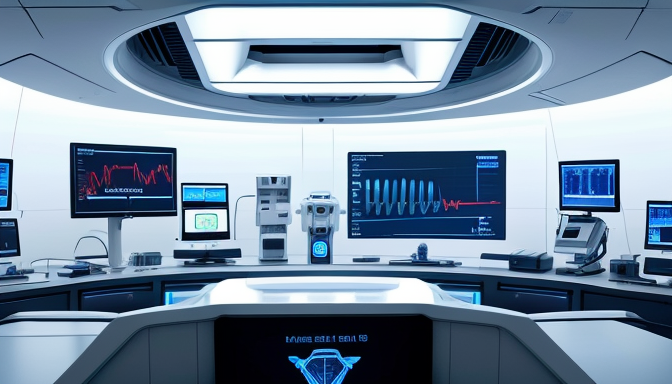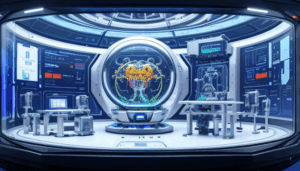In recent years, the field of medicine has witnessed a remarkable transformation, largely driven by the advent of artificial organs. These incredible innovations are not just science fiction; they are reshaping the landscape of life-saving treatments for countless individuals. Imagine a world where a failing organ can be replaced with a synthetic counterpart that functions seamlessly within the human body. This is not a distant dream; it is becoming our reality.
The integration of artificial organs into medical practice has opened up new avenues for treating conditions that were once considered fatal. For instance, patients suffering from heart failure can now rely on mechanical hearts that mimic the function of a natural heart, providing them with a second chance at life. Similarly, artificial kidneys are offering hope to those on dialysis, significantly improving their quality of life. These advancements not only save lives but also enhance the overall treatment experience, allowing patients to lead more fulfilling lives.
But how do these artificial organs actually work? They are designed using cutting-edge technology that allows for better compatibility with the human body. Engineers and medical professionals collaborate to create devices that can respond to the body’s needs, much like a natural organ would. This biocompatibility is crucial, as it minimizes the risk of rejection and maximizes the effectiveness of the treatment.
As we look to the future, the possibilities seem endless. The ongoing research into artificial organs is paving the way for innovations such as bioengineered organs and personalized medicine. These advancements promise to redefine treatment protocols, making them more tailored to individual patient needs. In essence, artificial organs are not just improving survival rates; they are revolutionizing the very essence of patient care.
Advancements in Artificial Organ Technology
Recent innovations in artificial organ technology have ushered in a new era of medical treatments that are not only more effective but also more integrated with the human body. Imagine a world where a failing heart can be replaced with a device that not only mimics its function but also adapts to the patient’s unique biology. This is no longer a distant dream; it’s happening right now!
One of the most significant advancements is the development of bioengineered organs. These organs are created using a combination of synthetic materials and living cells, allowing for a seamless integration with the body. For instance, researchers are now able to grow artificial kidneys that can filter blood just like their natural counterparts. This leap forward not only enhances functionality but also reduces the risk of rejection by the immune system.
Moreover, the incorporation of smart technology into artificial organs has revolutionized patient care. Devices are now equipped with sensors that monitor vital signs and adjust their functions in real-time. This means that patients can receive tailored treatments that respond to their immediate health needs. For example, an artificial pancreas can automatically deliver insulin based on glucose levels, offering a significant improvement for diabetes management.
Additionally, advancements in 3D printing have made it possible to create customized artificial organs that fit perfectly within a patient’s anatomy. This technology not only speeds up the production process but also significantly lowers costs. In fact, a recent study showed that 3D-printed organs could reduce surgery times by up to 30%, which is a game-changer in emergency situations.
In summary, the advancements in artificial organ technology are not just about replacing failing organs; they are about enhancing the quality of life for patients. With ongoing research and development, the future looks bright for those in need of life-saving treatments.

The Impact on Patient Survival Rates
Artificial organs are truly game-changers in the realm of medicine, especially when it comes to patient survival rates. Imagine a world where someone suffering from organ failure doesn’t have to wait on a long list for a donor organ. Instead, they can receive a state-of-the-art artificial organ that not only saves their life but also allows them to live it to the fullest. It’s like switching from a rusty old car to a brand-new model that runs smoothly and efficiently!
Recent studies have shown that the introduction of artificial organs has led to a remarkable increase in survival rates. For instance, patients with artificial hearts have experienced a significant reduction in mortality rates compared to those on traditional treatments. This is not just a small leap; it’s a giant leap for mankind! The following table illustrates the impressive statistics:
| Type of Organ | Traditional Survival Rate (%) | Artificial Organ Survival Rate (%) |
|---|---|---|
| Heart | 50 | 80 |
| Liver | 60 | 85 |
| Kidney | 70 | 90 |
These numbers speak volumes about how far we’ve come in critical care medicine. Not only do artificial organs provide a reliable alternative, but they also reduce the overall burden on the healthcare system by minimizing the need for donor organs. It’s a win-win situation that is reshaping the landscape of patient care!
However, it’s essential to recognize that while these advancements are incredible, they also come with their own set of challenges. Patients must adapt to new technologies, and there’s a learning curve involved. But the overwhelming benefits of improved survival rates often outweigh these challenges, making artificial organs a beacon of hope for many.
Ethical Considerations and Challenges
As we embrace the revolutionary potential of artificial organs, it’s crucial to pause and reflect on the ethical considerations that accompany these advancements. With the ability to replace failing organs, we find ourselves at a crossroads where technology meets morality. For instance, while artificial organs can save lives, they also pose questions about accessibility. Who gets these life-saving devices? Is it fair that wealthier individuals may have better access to advanced treatments compared to those from underprivileged backgrounds? This disparity raises significant concerns about equity in healthcare.
Moreover, we must consider the informed consent process. Patients need to fully understand the implications of receiving an artificial organ, including potential risks and long-term effects. Are we doing enough to ensure that patients are making informed choices? The complexity of these technologies can sometimes lead to confusion, and it’s our responsibility to ensure clarity.
Another pressing issue is the replacement of natural organs. While artificial organs can mimic the function of their biological counterparts, they may not fully replicate the intricate processes of the human body. This leads us to ponder: are we playing God by replacing natural organs? The implications of such actions can be profound, affecting not only the individual but also societal perceptions of life and death.
To navigate these challenges, collaboration between medical professionals, ethicists, and policymakers is essential. We need to establish guidelines that prioritize patient welfare while fostering innovation. As we stand on the brink of a new era in medicine, it’s imperative that we address these ethical dilemmas head-on to ensure that the benefits of artificial organs are shared equitably and responsibly.

Future Trends in Artificial Organ Research
The future of artificial organ research is brimming with exciting possibilities that could revolutionize healthcare as we know it. Imagine a world where organs can be custom-designed to fit the unique biology of each patient. This is not just a dream; it’s becoming a reality thanks to advancements in bioengineering and regenerative medicine. Researchers are exploring ways to create organs using a patient’s own cells, reducing the risk of rejection and improving compatibility.
One of the most promising areas of research is the development of bioengineered organs. These organs are designed to mimic the structure and function of natural organs, using materials that are biocompatible. For instance, scientists are working on creating artificial kidneys that can filter blood just like their biological counterparts. This could significantly reduce the burden on dialysis and transplant systems, providing patients with a more sustainable and effective treatment option.
Moreover, the integration of personalized medicine into artificial organ research is set to change the game. By utilizing genetic information, doctors could tailor organ designs to meet the specific needs of individual patients. This approach not only enhances the effectiveness of treatments but also minimizes potential complications. As we move forward, the collaboration between technology and medicine is expected to yield even more groundbreaking innovations.
Of course, with these advancements come challenges. Ethical considerations regarding the accessibility of these technologies must be addressed. Will everyone have equal access to these life-saving innovations? As we navigate this complex landscape, it’s crucial for medical professionals and policymakers to engage in open dialogues to ensure that the benefits of artificial organs are available to all who need them.
In conclusion, the future of artificial organ research is not just about creating new technologies; it’s about transforming lives. As we continue to push the boundaries of what’s possible in medicine, we can look forward to a future where organ failure is no longer a death sentence but a challenge that can be met with innovative solutions.
Patient Experiences and Testimonials
When it comes to artificial organs, the stories of patients who have undergone these life-changing procedures are nothing short of inspiring. Imagine waking up one day, feeling like your life is on the line, and then hearing that a synthetic organ could be your ticket to a healthier future. That’s exactly what happened to Sarah, a 34-year-old mother of two, who received an artificial heart after battling severe heart disease. “I felt like I was given a second chance at life,” she shares, her eyes sparkling with hope.
But Sarah’s story is just one of many. Across the globe, patients are sharing their journeys, highlighting the profound impact that artificial organs have had on their lives. From kidney transplants to advanced bionic limbs, these innovations are not just medical marvels; they are lifelines for individuals who once faced grim prospects. For instance, John, a retired veteran, regained his mobility after receiving a state-of-the-art prosthetic leg. “I never thought I would run again,” he admits, a smile breaking across his face as he recounts his first steps post-surgery.
These testimonials not only showcase the technical advancements but also emphasize the emotional and psychological transformations that accompany such procedures. Patients often report feeling more confident and empowered, as if they have reclaimed a part of their identity that was lost due to illness or injury. As one patient put it, “It’s not just about surviving; it’s about thriving.”
However, it’s essential to recognize that the journey doesn’t end post-surgery. Many patients face ongoing challenges, from adapting to their new organs to managing the psychological impacts of their experiences. This is where support networks and counseling can play a vital role. In fact, many hospitals now offer programs that connect patients with others who have undergone similar procedures, fostering a sense of community and shared understanding.
As we look to the future, the stories of these brave individuals remind us that artificial organs are more than just technological feats; they represent hope, resilience, and the relentless human spirit. With ongoing advancements, the potential for even more remarkable transformations in patient care is just on the horizon.
Frequently Asked Questions
- What are artificial organs?
Artificial organs are man-made devices that are designed to replace or support the function of natural organs. They can include anything from artificial hearts and kidneys to advanced prosthetic limbs, helping patients regain their health and improve their quality of life.
- How do artificial organs improve patient outcomes?
Artificial organs significantly enhance patient outcomes by providing life-saving alternatives for those suffering from organ failure. They reduce the dependency on donor organs, minimize the risk of rejection, and often integrate more seamlessly with the human body, leading to better recovery and survival rates.
- Are there any ethical concerns surrounding artificial organs?
Yes, the development of artificial organs raises various ethical issues, such as accessibility for all patients, informed consent, and the potential implications of replacing natural organs. These concerns must be addressed by healthcare professionals and policymakers to ensure fair and effective treatment options.
- What is the future of artificial organ technology?
The future looks promising! Ongoing research is focusing on bioengineered organs and personalized medicine, which could revolutionize treatment protocols. Imagine a world where organs are tailored to individual needs, drastically improving patient care and outcomes.
- Can patients share their experiences with artificial organs?
Absolutely! Hearing from patients who have benefited from artificial organs provides invaluable insights. Their testimonials often highlight the challenges they faced and the profound impact these innovations have had on their lives, inspiring hope for others in similar situations.

